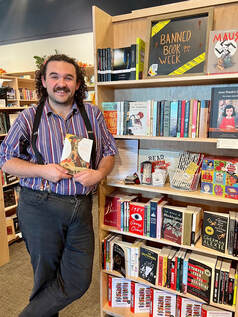 “Embrace diversity. Unite-- Or be divided, robbed, ruled, killed By those who see you as prey. Embrace diversity Or be destroyed.” - Octavia Butler, Parable of the Sower) Books for me have always been a bridge to something else. A bridge to a fantastical realm that I wish existed. A bridge to a happier outlook when I am feeling down. A bridge to a life that I don’t have the perspective to understand. A bridge connecting me to the author and every person touched by the words they put to paper. During the pandemic I started a reading group with some friends online in a desperate need for community when I, like many others, was feeling so alone, grappling with the world around me. We read a few books but the one that stopped me in my tracks and built a bridge for me was Parable of Sower by Octavia Butler. If you have not read the book, it is the story of Lauren Oya Olamina, told through her journal entries as she is forced out of her tight knit religious community and into a climate ravaged version of California. She along the way builds a family, creates a doctrine that we could all do good living by, and grows something new out of the crumbling world around her. That’s not even the bare bones of what the book actually becomes for the reader, but it’s the easiest way I can describe it at this moment. Parable of the Sower, like many great banned books, takes on big discussions of poverty, religion, race, womanhood, etc. The reasonings offered up for banning the title are often that the discussions of the aforementioned topics are too tough for children or young adults to be confronted by. “These things frighten people. It’s best not to talk about them.” "But, Dad, that’s like … like ignoring a fire in the living room because we’re all in the kitchen, and, besides, house fires are too scary to talk about” (Octavia E. Butler, Parable of the Sower). Reading books from a young age has always been an exercise for me in expanding my horizons and building bridges to the world around me that my privilege or perspective did not allow me to see otherwise. This book helped me to grapple with so many of the tough conversations happening in the midst of the global pandemic. From kids to adults, books like this help us to think about, discuss, and come to terms with the hard realities happening around us. Books like this build bridges so that we can see each other and empathize across the gender spectrum. Books like this help those in the middle and upper classes build bridges to understand the lived experiences of those in poverty. And books like this build bridges so we can become not only a more equal society, but also a more equitable, and most importantly more compassionate society. Banned Book Week works to bring to the forefront that we are not banning merely words printed on pages. We are banning diversity of perspective. We are silencing voices that don’t align with the imagined realities some in power have decided is canon. Banned Books Week serves to remind us that we must fight these challenges to these lived realities and keep reading free. “Freedom is dangerous but it's precious, too. You can't just throw it away or let it slip away. You can't sell it for bread and pottage.” (Octavia E. Butler, Parable of the Sower)
2 Comments
10/1/2023 03:34:40 pm
Octavia Butler was a pure genius, writing about themes that we all need to be aware of if only some of us weren't too afraid to face them. I can only imagine how she would react to the resurgence of fierce attacks by banners today.
Reply
Leave a Reply. |
Archives
January 2024
CateGORIES |

 RSS Feed
RSS Feed